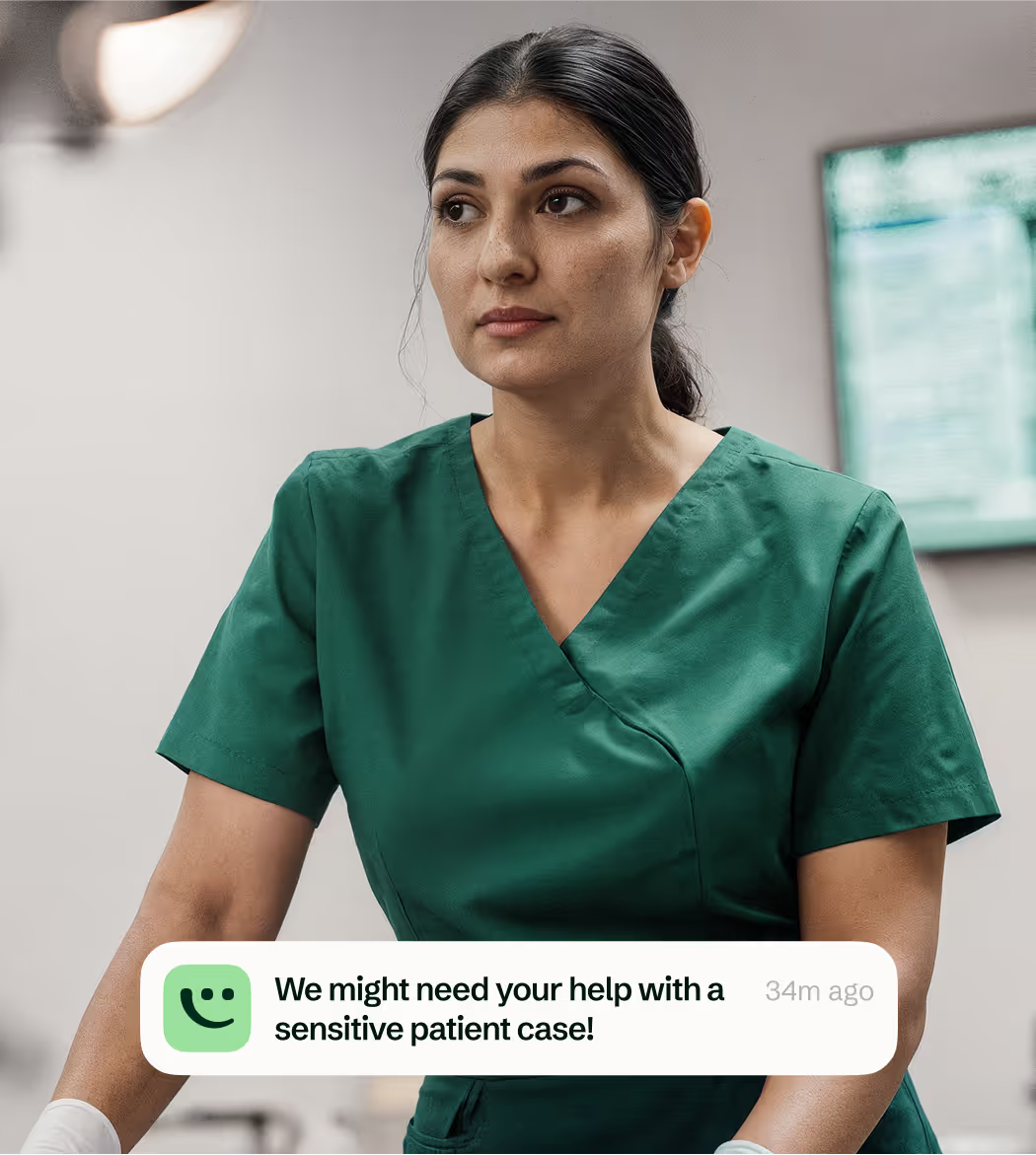Responsible AI, Built with Care
Technology should be transparent, accountable, and always designed with human care at its core.
.avif)
At Resonate AI, we believe
technology should serve people - not the other way around.
That’s why we design AI systems that support dental teams with empathy, clarity, and full transparency.




Our AI Principles
.svg)
Purpose-Built, Not General-Purpose
Our AI is designed specifically for dental support

Human-Led Decision-Making
AI supports - never replaces - your staff

Transparent Interactions
Patients are always informed when speaking with AI

Privacy by Design
HIPAA-aligned from day one

Bias-Aware Systems
Continuously reviewed and improved
.svg)
Our AI Principles

Minimal Voice Data Use
No voice recording beyond necessary processing

Patient Privacy Respected
No scraping of external patient data

Clinicians Decide, Not AI
No clinical or diagnostic decisions made by AI
Continuous Improvement
Transparency & Updates
All AI interactions are logged and reviewed for performance and safety. We publish regular updates to our compliance practices and welcome feedback from users and patients alike.

Frequently Asked Questions
Get answers to common questions about Resonate AI
Absolutely. Security and compliance are built into Resonate AI's foundation. We operate under strict HIPAA guidelines and maintain full compliance through encrypted data transmission, secure cloud storage, and careful handling of patient information. We do not ask for or store any sensitive medical information during initial conversations – only basic scheduling info. All data is encrypted in transit and at rest, with North America-based development and strict data governance protocols. You maintain control of your data at all times, and our systems are regularly audited for security.
Our AI's natural conversation ability is so advanced that professionals often can't distinguish it from human staff. In one documented case, an oral surgeon called his office from vacation and had a full conversation with the AI "Katie" without realizing it wasn't a person. We achieve this through sophisticated language processing, natural typing delays, empathetic responses, and conversation flow that mirrors human interaction – all while maintaining your practice's unique voice and style.
Resonate AI always hands things over when needed. If a patient asks for a human or mentions an emergency, the AI flags that request and sends details to your team immediately. The AI is also designed with intelligent escalation – when it encounters complex situations beyond its scope, it gracefully collects relevant information and creates a priority notification for your team.
Think of it like a highly trained assistant who's memorized thousands of successful dental conversations. When a patient texts, the AI instantly analyzes their message, understands the intent (scheduling, emergency, question), and crafts a response based on successful patterns. It's not just matching keywords – it understands context. If someone says "my tooth is killing me," it recognizes urgency and responds with appropriate empathy and scheduling priority.
We collect only what's necessary for scheduling and communication: names, phone numbers, preferred appointment times, and general reason for visit. We don't store sensitive medical information in initial conversations. This data is used solely to serve your practice and patients better. Aggregated, anonymous patterns help improve the AI for everyone, but individual patient data is never shared. You own your data and can export or delete it anytime.
Yes, patients have complete control over their communication preferences. They can opt out simply by responding to any message indicating they prefer to speak with human staff. When a patient opts out, our AI immediately recognizes this preference, flags their profile, and ensures all future interactions are handled directly by your team. We believe in patient autonomy and respect individual communication preferences.
Let's be transparent: Our AI excels at scheduling, basic triage, and information gathering. It doesn't provide medical advice, diagnose conditions, or handle complex treatment planning. It can't process payments or access detailed medical records. If a conversation becomes too complex or emotional, it knows to escalate to your team. We built it to do specific things exceptionally well rather than everything mediocrely.
We actively monitor for bias in conversation patterns and outcomes. The AI treats every patient with the same respect and urgency regardless of insurance type, presumed socioeconomic status, or any demographic factors. We regularly audit conversations to ensure equitable treatment and adjust if we see any patterns of concern. Fair access to dental care is part of our mission.
We use aggregated, anonymized patterns to improve the AI's general capabilities, but never individual patient conversations with identifiable information. Think of it like this: if we notice 100 practices successfully handle insurance objections a certain way, we'll enhance that capability for everyone, but without any specific patient's data being exposed or shared.
First, our AI is designed to err on the side of caution – when uncertain, it collects information and escalates to your team. If a mistake occurs, our system flags it for review, your team is notified immediately, and we work to correct it if needed. We also learn from every mistake to prevent recurrence.
Ethics guides every decision. We never use dark patterns to manipulate patients, never share data inappropriately, and never pretend the AI is human when asked directly. We're transparent about capabilities and limitations. Our AI shows empathy because that's good patient care, not because we're trying to deceive. We believe ethical AI builds long-term trust and better patient outcomes.
No, the AI doesn't access detailed medical records or treatment histories. It works with scheduling information and basic intake data only. This is intentional – it protects patient privacy and keeps the AI focused on its core job: capturing opportunities and scheduling appointments. Your sensitive medical data stays exactly where it should: in your secured practice management system.

.svg)





.avif)
